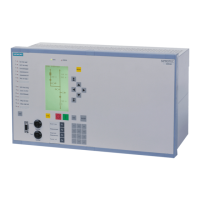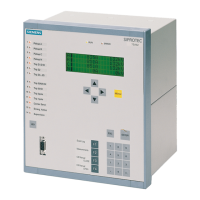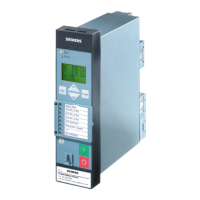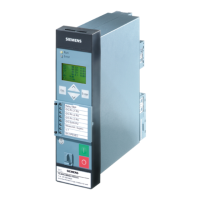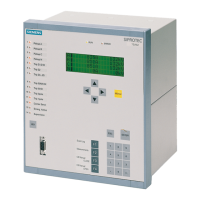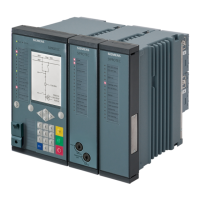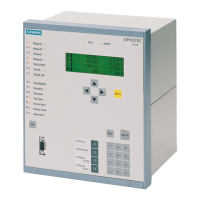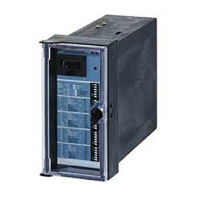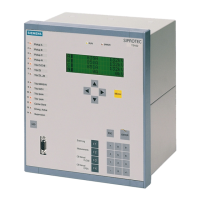The setting for the mentioned voltage values is made in secondary volts. When using the PC and DIGSI for
configuration, these values can also be entered as primary values. Depending on the connection of the
voltages these are phase-to-ground voltages or phase-to-phase voltages.
Addresses 6x07 to 6x10 are set to specify the release conditions for the closing check. Where:
6x07 SYNC V1<V2> = Component V
1
must be de-energized, component V
2
must be energized (connection to
reference without voltage, dead line);
6x08 SYNC V1>V2< = component V
1
must be energized, component V
"
voltage value must be de-energized
(connection to feeder without voltage, dead bus);
6x09 SYNC V1<V2< = Component V
1
and Component V
"
must be de-energized (connection when reference
and feeder are de-energized, dead bus/dead bus);
6x10A Direct CO = Command is released without checks.
The possible release conditions are independent of each other and can be combined. It is obviously not
reasonable to combine Direct CO with other release conditions.
Parameter TSUP VOLTAGE (address 6x11A) can be set to configure a monitoring time which requires above
stated release conditions to be at least fulfilled for de-energized connection before switching is allowed. The
preset value of 0.1 s accounts for transient responses and can be applied without modification.
Release via synchronism check can be limited to a configurable synchronous monitoring time T-SYN. DURA-
TION (address 6x12). The configured conditions must be fulfilled within this time period. Otherwise, release is
not granted and the synchronization function is terminated. If this time is set to ∞, the conditions will be
checked until they are fulfilled.
For special applications (e.g. connecting a ground switch), the closing release under satisfied synchronism
conditions can be activated or deactivated in parameter 6x13A 25 Synchron.
Power System Data
The power system data for the synchronizing function are set at addresses 6x20 to 6x25.
The circuit breaker closing time T-CB close at address 6x20 is required if the device is to close also under
asynchronous system conditions, no matter whether for manual closing, for automatic reclosing after three-
pole tripping, or for both. The device will then calculate the time for the close command such that the
voltages are phase-synchronous the instant the breaker poles make contact. Please note that this should
include the operating time of the breaker as well as the operating time of an auxiliary relay that may be
connected in the closing circuit.
The parameter Balancing V1/V2 (address 6x21) can be set to account for different VT ratios of the two
parts of the power system (see example in Figure 2-129).
If a transformer is located between the system parts to be synchronized, its vector group can be accounted for
by angle adjustment so that no external adjusting measures are required. Parameter ANGLE ADJUSTM.
(address 6x22A) is used for that purpose.
The phase angle from V
1
to V
"
is evaluated positively.
Example: (see alsoFigure 2-129):
Busbar
400 kV primary; 110 V secondary
Feeder 220 kV primary; 100 V sekundär
Transformer 400 kV/220 kV; vector group Dy(n) 5
The transformer vector group is defined from the high side to the low side. In the example, the reference
voltage transformers (V
1
) are the ones of the transformer high side, i.e. the setting angle is 5 x 30° (according
to vector group), that is 150°:
Address 6x22A: ANGLE ADJUSTM. = 150°.
The reference voltage transformers supply 100 V secondary for primary operation at nominal value while the
feeder transformer supplies 110 V secondary. Therefore, this difference must be balanced:
Address 6x21:Balancing V1/V2 = 100 V/110 V = 0.91.
Functions
2.21 Synchronization Function
SIPROTEC 4, 7SJ62/64, Manual 299
C53000-G1140-C207-8, Edition 08.2016
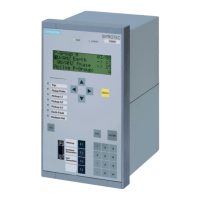
